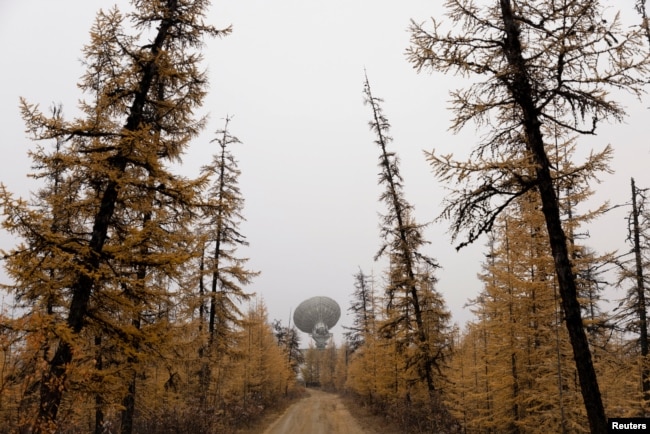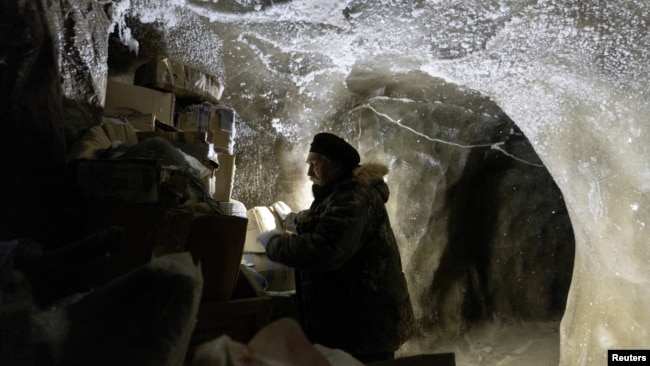彼はウクライナのみならず、地球を破滅させようとしています。
科学が後退するからです。永久凍土は、地球環境のみならず、これから人類が直面するウィルスとの戦いをも意味します。
さて、今日もVOAで英語を学びましょう!!
ウクライナ戦争はロシアの科学にどのような打撃を与えているか (和訳)
How the Ukraine War Is Hurting Russian Science
April 18,2022
ロシアのウクライナ侵攻により、欧米諸国はロシアの科学プロジェクトを支援するために使われていた数千万ドルの資金を停止させました。その結果、ロシアと欧米の組織の間で結ばれていた数百の提携が中止されたり、保留になったりしたいます。
このような変化は、欧州諸国などがロシアに課している重い制裁措置と関連しています。この制裁は、ウクライナで軍事攻勢を続けているロシアを罰することを目的としています。
ロイター通信は、ウクライナでの戦争がロシアの科学に与えている影響について、多数の科学者に話を聞きました。
ロシア科学財団の国が支援する2021年度予算2億1300万ドルは、インド、中国、日本、フランス、オーストリア、ドイツなどからの援助に依存していました。
同財団の広報担当者は、パートナーからの融資がないことが業務にどう影響するかというロイターの質問には答えませんでした。同代表は、財団は”主要な研究者チームとその研究プロジェクトの支援を続ける”予定だとだけ述べました。
影響を受けるプロジェクトの中には、ロシア国内のハイテク研究所の建設に関わるものもあります。その中には、ヨーロッパが2740万ドルを提供すると約束したイオン衝突型加速器と中性子炉があります。
科学者によると、こうしたセンターは、新素材、燃料、薬品、その他の発明の開発につながるかもしれない物理学の研究において重要な役割を担っているとのことです。
また、低炭素材料とバッテリー技術の設計のために用意された1670万ドルも凍結されました。この動きは、欧州連合(EU)が先月、ロシアの組織との協力をすべて停止したことに続くものです。
科学プロジェクトの1つである研究ステーションは、ドイツのマックス・プランク生物地球化学研究所から支援を受けてきました。しかし、ロシアがウクライナに侵攻した後、同機関は北極圏の気候変動を研究する同ステーションへの財政的支援を停止したのです。
ペーター・ハーガースベルク氏はマックス・プランク協会の広報担当者で、同協会はドイツの連邦政府だけでなく州からも資金援助を受けています。
彼はロイターに対し、財政支援の凍結はおそらくロシアの北東科学観測所の継続的な測定を中断させることになるだろうと語っています。シベリアのコリマ川沿いにある同ステーションは、2013年から記録を続けてきました。
ハガースバーグ氏は、そこの研究者が "ステーションを稼働させ続けようとしている "と述べています。彼は、プロジェクトからどれだけの資金が差し引かれているのかについては言及しませんでした。
ロイターに語った科学者たちは、ロシアのウクライナ侵攻は、1991年のソ連崩壊後、国際科学協力の構築に費やされた年月を台無しにしたと述べています。
現在、科学組織間の多くのコミュニケーションが停止しており、研究旅行も延期されています。
北極圏の懸念事項
より緊急性の高い研究活動として、ロシアの北極圏における気候変動の研究プロジェクトが保留されています。
テッド・シューア氏は、北アリゾナ大学の生態学者で、永久凍土炭素ネットワークに所属しています。永久凍土とは、世界の寒冷地で常に凍結している土壌の層のことです。世界の永久凍土地帯の3分の2はロシアにあるので、そこからのデータはとても重要だと彼はいいます。
「もし、ロシアで永久凍土の変化に対する見方を断つなら、永久凍土に対する地球規模の変化に対する我々の理解を断つことになります。」とシューア氏は付け加えます。
科学者たちは、ロシアのプロジェクトに対する資金援助の停止は、気候変動に関する重要な研究を遅らせる可能性があるため、憂慮すべきことだと考えています。気候変動によって、推定1兆5千億トンの有機炭素を保持している長い間凍結していた地面が溶けてしまうのだから、なおさらです。これは、現在すでに大気中にある量の2倍にあたります。
科学者たちは、地面が溶けるにつれて、地球温暖化ガスが大気中に放出されることを恐れています。
シュア氏は、科学者は衛星を使って陸上の変化を見ることができますが、地下で何が起こっているかを見ることはできないと言っています。北極圏では、地下の変化を調べるための科学チームが必要なのです。
ロシアの科学者たちは、何年にもわたって永久凍土の現場データを収集し、共有してきました。しかし、ウクライナ戦争が続く中、欧米の研究者は研究活動の先行きを不安視しています。
How the Ukraine War Is Hurting Russian Science
Russia’s invasion of Ukraine has led Western nations to suspend tens of millions of dollars used to support Russian science projects. As a result, hundreds of partnerships between Russian and Western organizations have been canceled or put on hold.
The changes are linked to heavy sanctions placed on Russia by European nations and others. The sanctions aim to punish Russia for its ongoing military offensive in Ukraine.
Reuters news agency spoke with numerous scientists about the effects the war in Ukraine is having on Russian science.
The Russian Science Foundation’s state-supported 2021 budget of $213 million was dependent on aid from India, China, Japan, France, Austria, Germany, and others.
A spokesperson for the foundation did not answer questions from Reuters about how the lack of partner financing would affect its work. The spokesperson said only that the foundation planned to “continue to support leading teams of researchers and their research projects.”
Some of the affected projects involved the building of high-tech research centers in Russia. Among them are an ion collider and a neutron reactor for which Europe promised to give $27.4 million.
Scientists said such centers play an important part in physics research that may result in the development of new materials, fuels, drugs, or other inventions.
Another $16.7 million set aside for the design of low-carbon materials and battery technologies was also frozen. The move came after the European Union stopped all cooperation with Russian organizations last month.
One science project, a research station, has been supported by Germany’s Max Planck Institute for Biogeochemistry. But after Russia invaded Ukraine, the organization stopped financially supporting the station, which studies climate change in the Arctic.
Peter Hergersberg is a spokesperson for the Max Planck Society, which receives money from Germany’s federal government as well as states.
He told Reuters the freeze in financial support will probably lead to a break in continuous measurements at Russia’s Northeast Science Station. The station, which sits on the Kolyma River in Siberia, has been keeping records since 2013.
Hergersberg said researchers there were trying “to keep the station running." He did not say how much money was being withheld from the project.
Scientists who spoke to Reuters said Russia’s invasion of Ukraine has undone years spent building international science cooperation following the Soviet Union’s 1991 collapse.
A lot of communication between scientific organizations is currently stopped and research trips have been postponed.
Arctic concerns
Among the more urgent research efforts on hold are projects to study climate change in the Russian Arctic.
Ted Schuur is a Northern Arizona University ecologist who works with the Permafrost Carbon Network. Permafrost is a layer of soil that is always frozen in cold areas of the world. He said two-thirds of the world’s permafrost area is in Russia, so data from there is very important.
“If you cut off your view of changing permafrost in Russia, you're really cutting off our understanding of global changes to permafrost,” Schuur added.
Scientists see the suspension of financial support for Russian projects as worrying because it could delay important research on climate change. This is especially true as climate change melts the long-frozen ground that holds an estimated 1.5 trillion tons of organic carbon. That is twice the amount already in the atmosphere today.
Scientists fear that as the ground melts, planet warming gases could be released into the atmosphere.
Schuur said while scientists can use satellites to see changes on land, they cannot see what is happening below ground. Scientific teams are needed in the Arctic to study the underground changes.
Russian scientists have collected and shared permafrost field data for years. But as the war in Ukraine continues, Western researchers are not sure about the future of the research efforts.
Words in This Story
sanction – n. an action that is taken or an order that is given to force a country to obey international laws by limiting or stopping trade with that country, by not allowing economic aid for that country – usually plural
collider – n. a machine used to force particles to hit each other at high speed so scientists can study the results
layer – n. the amount of a substance covering a surface
organic – adj. happening or developing naturally over time, without being forced or planned by anyone

